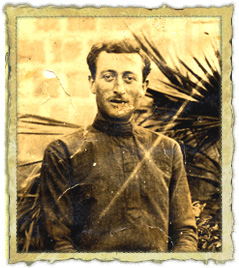The life of Natan, the son of Joseph from Volyn Oblast (province)
Should they wed their son they will not open an iron shop, and should they wed their daughter they will not open a flour shop. They are unlike those grooms receiving dowry in order to start manofactura trading. They are unlike those who are strolling with a stick on the market day, chewing straw and giving their opinion on the wheat.
They have been farmers for a long time, leasing the nearby fruit trees gardens.
At harvest time, they set up branches arbors or lease a piece of land where they grow vegetables to make a living. The people of Pahost are quick, healthy and full of energy.
They were tanned from the Podolia sun, their blood was stimulated by the Russian frost and their body was strengthened by work. They were clumsy and wore short clothing.
People from other Jewish towns disrespected the people of Pahost. Their gentile lifestyle, working seven days a week in the fields, no prayers, no Tora, dressed as the gentiles and behaving like the farmers. The Jews from Pahost were a disgrace to those from out of town.
Till one day, Joseph Bokser came to Pahost with his wife Pesia and their eight children (four sons and four daughters). Bokser was a Torani Jew of the Shtefanesht Hasidic dynasty.
Pesia was a hard working housewife. As soon as The Bokser family arrived in Pahost,
the neighbors from the surrounding towns changed their attitude. No more contempt
to the people of Pahost. Joseph Bokser's house became the meeting place for the
Shtefanesht Hasidic dynasty.
From the day Natan has returned from The Pinsk Yeshiva (Jewish educational institution)
and started reading Deuterocanonical books, the Bokser's house turned into a club for the young people of Pahost. Reading books, singing, dancing, plowing and harvesting, getting ready for the creation of a Jewish homeland in Palestine.
Natan moved to Odessa where he was a regular participant at the synagogue and the modern Yeshiva "Yavne", in the company of Mendele, Ravnitzky and Ussishkin.
When it's time for Natan to enlist to the army, he conscripts to the military service and in 1908 he crosses the border. He arrives at Jaffa Port aftr 26 days. He is arrested for having no immigration documents. He escapes from prison and starts working at a timber storage as a stevedore.
He then moves to the Galilee, and being an expert he joins the agricultural works. On The "Sejera farm" he not only proves to be an expertise in agriculture but also in administration.
In 1910, Natan arranges jobs for the unemployed on the Kerak lands, as well as for 60 laborers at The Migdal Estate to grow lucerne and cotton.
In Damascus, Natan specializes in irrigation and studies various ways to export plants and vegetables. Upon his return from Damascus, he leases together with Hava, a piece of land.
Natan and the laborers from Migdal, take upon themselves the responsibility for growing vegetables for export. These laborers, later on established a new "Moshav Ovdim"
(a workers cooperative settlement).
In 1915 swarms of locusts infested thru. Natan was appointed by the Turkish governor to monitor the extermination operations, while at the same time was nominated by the "Choresh association" to manage the public works.
In 1919 Palestine was governed by the British Mandate, the connection between the northern and southern parts of Palestine were renewed. In that year, Natan was elected member of the Agricultural Center. He was also nominated to manage the public works. Natan's family together with a small group of laborers, established Hamra.
1920 - The Arabs were fighting the French, 4 settlements in the Galilee were ruined and abandoned - Hamra, Kfar Giladi, Tel Hai and Metula. Natan at the time was serving as a liaison officer and was responsible for the supply of weapons and provisions.
After the fall of Hamra, Natan settled in Tiberias and worked as a contractor foreman in Yavniel and Kinneret. At the same time he was offered by the British Mandatory government, to start the Tiberias-Tzemach road construction .
The contract was signed and Natan started preparations for this project. Six hundred workers were engaged in this project at the time. Other projects that commenced that year were - The Tiberias-Tabha road, Haifa, Geva, Sarafend, Rosh Ha'Ain-Petach Tikva railway, Lod, Yavne and many more. When Natan is busy organizing the settlement of Kfar Yehezkel, he is required to take upon himself more responsibilities and thus is enforced to move to Borochov neighborhood.
The consumer cooperatives known as "HaMashbir was founded and Natan was required to deal with the marketing and exporting of the farms produce. This activity was under the title of a department in HaMashbir. Tnuva Central Cooperative for the Marketing of Agricultural Produce in Israel Ltd. was created in 1926, following a decision by kibbutz-movement leaders to make cooperatives to distribute and export several types of food produce until it became an independent plant.
Natan was appointed manager of BIA"F (eggs, vegetables, poultry, fruits) department.
In 1932, after 25 years, Natan resigned from his public positions and started working in the agricultural produce private sector.
Throughout the years, Natan and Hava, worked hard, raised four children who had taken strong roots in the county, some of them living on a Kibbutz.
In the Borochov nighborhood, Natan served in any possible committee, local and public. He was involved in public activities, in public business issues, in all sorts of arbitrations. As the years go by, Natan is aging but still young in spirit. He dedicates his life to the local veterans club. Every Monday and Wednesday, while the club members are busy reading, talking and playing, Natan is walking among them encouraging and providing emotional support.
The members in the veterans club being very thankful to Natan, celebrated with him his 50th anniversary of his immigration to Israel.
|
 |

